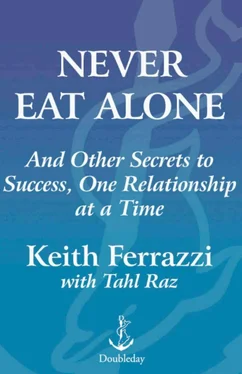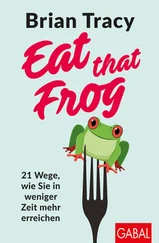Keith Ferrazzi - Never Eat Alone
Здесь есть возможность читать онлайн «Keith Ferrazzi - Never Eat Alone» весь текст электронной книги совершенно бесплатно (целиком полную версию без сокращений). В некоторых случаях можно слушать аудио, скачать через торрент в формате fb2 и присутствует краткое содержание. Год выпуска: 2005, ISBN: 2005, Издательство: C U R R E N C Y • D O U B L E D A Y, Жанр: marketing, на английском языке. Описание произведения, (предисловие) а так же отзывы посетителей доступны на портале библиотеки ЛибКат.
- Название:Never Eat Alone
- Автор:
- Издательство:C U R R E N C Y • D O U B L E D A Y
- Жанр:
- Год:2005
- ISBN:0-385-51529-4
- Рейтинг книги:4 / 5. Голосов: 1
-
Избранное:Добавить в избранное
- Отзывы:
-
Ваша оценка:
- 80
- 1
- 2
- 3
- 4
- 5
Never Eat Alone: краткое содержание, описание и аннотация
Предлагаем к чтению аннотацию, описание, краткое содержание или предисловие (зависит от того, что написал сам автор книги «Never Eat Alone»). Если вы не нашли необходимую информацию о книге — напишите в комментариях, мы постараемся отыскать её.
Never Eat Alone — читать онлайн бесплатно полную книгу (весь текст) целиком
Ниже представлен текст книги, разбитый по страницам. Система сохранения места последней прочитанной страницы, позволяет с удобством читать онлайн бесплатно книгу «Never Eat Alone», без необходимости каждый раз заново искать на чём Вы остановились. Поставьте закладку, и сможете в любой момент перейти на страницу, на которой закончили чтение.
Интервал:
Закладка:
So how did they get that way? The easiest route is by expertise. As I look back on my career, the recipe seems straightforward:
I'd latch on to the latest, most cutting-edge idea in the business world. I'd immerse myself in it, getting to know all the thought leaders pushing the idea and all the literature available. I'd then distill that into a message about the idea's broader impact to others and how it could be applied in the industry I worked in. That was the content. Becoming an expert was the easy part. I simply did what experts do: I taught, wrote, and spoke about my expertise.
At ICI, my first job after college, I talked my way into a management-training program by convincing the interviewer to take on a liberal arts major as an experiment. Every trainee who had ever been hired prior to that had some fancy degree in chemical engineering, material sciences, or something technical like that.
There was no way I was going to advance at ICI based on my engineering expertise. In my first few months of the program, however, I noticed that Total Quality Management was all the rage, one of those consultant-driven business trends that light the business world on fire every few years.
In my free time, I studied all the texts that were available. A few months into my job, I volunteered my "expertise," citing my background in organizational behavior (from my total of two undergraduate courses I had taken!). With one stroke, I became one of ICI's three go-to guys when it came to TQM. The thing is, I only really became an expert once I started trying to teach the discipline within the company. I would go on to parlay my experience into giving speeches, writing articles, and connecting with some of the top business minds in the country. After a short period, I even persuaded the industrial giant ICI to craft a new position for me within a newly forming group as one of the leaders of TQM in North America.
There's no better way to learn something, and become an expert at it, than to have to teach it. Some of the best CEOs I know refuse to turn away business even when it might call for skills or experience that their company doesn't have. These CEOs see such a scenario as an opportunity. "We can do that," they'll say. In the process, both the CEO and their employees learn skills they need. They jump at trying something new and they get the job done. In fact, after reading this book, there's no reason you couldn't put together a course on relationship building or content creation at your local community college. You'll learn in preparation, and gain even more interacting with students.
In short, forget your job title and forget your job description (for the moment, at least). Starting today, you've got to figure out what exceptional expertise you're going to master that will provide real value to your network and your company.
How do you start?
Well, there's the easy way and then there's the hard way, and I've done both. As I did at ICI and Deloitte, you can find someone who has already connected the dots and become an expert of their content. That's the easy way.
The hard way is connecting the dots on your own. The bad news is there's no concrete blueprint or step-by-step guide for this process. The good news is that creating content is not an act of divine inspiration or something reserved for the brilliant. Though I imagine both brilliance and inspiration could come in handy, I don't claim either in abundance. Instead, I've relied on some guidelines, a few habits, and a couple of techniques that have proven wonderfully useful.
Here are ten tips on helping you on your way toward becoming an expert:
1. Get out in front and analyze the trends and opportunities on the cutting edge.
Foresight gives you and your company the flexibility to adapt to change. Creativity allows you to take advantage of it. Today, where innovation has become more important than production, not moving forward means going backward. Early adaptors, trendspotters, knowledge brokers, change agents, and all those who know where their industry is heading and what next big ideas are coming down the pike have become the stars of the business world.
Identify the people in your industries who always seem to be out in front, and use all the relationship skills you've acquired to connect with them. Take them to lunch. Read their newsletters. In fact, read everything you can. Online, there are hundreds of individuals distilling information, analyzing it, and making prognostications. These armchair analysts are the eyes and ears of innovation. Now get online and read, read, read. Subscribe to magazines, buy books, and talk to the smartest people you can find. Eventually, all this knowledge will build on itself, and you'll start making connections others aren't.
2. Ask seemingly stupid questions.
If you ask questions that are like no other, you get results that are unlike any that the world has seen. How many people have the courage to ask those questions? The answer: all the people responsible for the greatest innovations. "Don't you think having all your MP3s on a little Walkman-like device would be cool?" Thus, the iPod. "Why can't we view our pictures immediately?" Thus, the instant photographic industry. "People sure like burgers and fries. Why not give it to them quickly?" Thus, McDonald's and the fastfood industry.
The power of innocence in business is wonderfully depicted in a scene from the movie Big, where Tom Hanks plays a kid transformed into an adult. In one poignant moment, Hanks is sitting in on an executive meeting at a major toy company, and one vice president is PowerPointing his way through a presentation about a new toy. All the numbers work. All the graphs point to a successful product launch. And yet Hanks's childlike innocence prompts him to say, "I don't get it." In actually playing with the toy, as he had, all the graphs and numbers didn't matter: The toy simply wasn't fun. Sometimes the numbers do lie. Sometimes all the PowerPoint presentations in the world won't provide cover for a company that has forgotten to ask the most basic of questions.
For years, the people running the companies that produced games believed they were in the entertainment business. I asked, "What if we're really in the marketing business?"
3. Know yourself and your talents.
I had no chance competing with the science geeks at ICI. In developing an expertise that highlighted my strengths, I was able to overcome my weaknesses. The trick is not to work obsessively on the skills and talents you lack, but to focus and cultivate your strengths so that your weaknesses matter less. I'd apply the 80/20 rule in that you should spend some time getting better at your weaknesses but really focus on building your strengths.
4. Always learn.
You have to learn more to earn more. All content-creators are readers or at least deep questioners or conversationalists. They're also sticklers when it comes to self-development. Your program of self-development should include reading books and magazines, listening to educational tapes, attending three to five conferences a year, taking a course or two, and developing relationships with the leaders in your field.
5. Stay healthy.
Research has discovered that at midafternoon, due to sleep deprivation, the average corporate executive today has the alertness level of a seventy-year-old. You think that executive is being creative or connecting the dots? Not a chance. Sounds hokey, but you have to take care of yourself—your body, mind, and spirit—to be at your best. As hectic as my schedule can get, I never miss a workout (five times a week). I try to take a five-day vacation every other month (I do check e-mails and catch up on reading). I go on a spirituality retreat once a month, even if it's a one-day local meditation retreat. And I do something spiritual each week—usually church. That gives me energy to allow me to keep my otherwise twenty-four-hour schedule.
Читать дальшеИнтервал:
Закладка:
Похожие книги на «Never Eat Alone»
Представляем Вашему вниманию похожие книги на «Never Eat Alone» списком для выбора. Мы отобрали схожую по названию и смыслу литературу в надежде предоставить читателям больше вариантов отыскать новые, интересные, ещё непрочитанные произведения.
Обсуждение, отзывы о книге «Never Eat Alone» и просто собственные мнения читателей. Оставьте ваши комментарии, напишите, что Вы думаете о произведении, его смысле или главных героях. Укажите что конкретно понравилось, а что нет, и почему Вы так считаете.












